Good though
Your Daughter’s Confidence May Drop at Age 8, and Here Are 6 Things You Can Do to Help Her
After your little girl reaches 8 years of age, her confidence will be tested by changes in friendships, her physical appearance, school responsibilities, and more. While we’re aware that these things can have an incredible influence over us, it’s completely new to these young girls. But luckily, there’s a way to help your daughter through it and get her confidence back. It will allow her to become stronger and can even ease her transition into a teenager.
We at Bright Side understand that confidence plays an important role in girls’ lives and without it, they can lower their chances of success. That’s why we’ve prepared a few ways for you to work on this together as a team.
1. Understand the reasons your little girl’s confidence might get lower.

One survey confirmed that 30% of girls’ confidence drops between the ages of 8 and 14. Usually, this is because parents expect perfection from them and are also overprotective. This means you likely want to protect your daughter from her own emotions and not allow her to make mistakes. Even letting her escape from her responsibilities can affect her confidence.
2. Let your daughter face her fears.
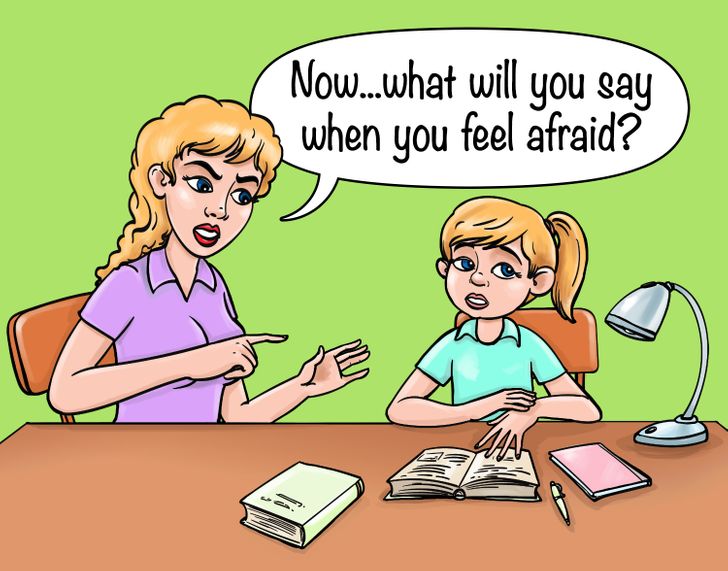
Even though comfort zones provide growth, this doesn’t mean that if your daughter is good at swimming she should quit taking lessons. It’s your job to encourage her to go beyond her fears. Since this is different for every girl, here’s how you can approach it:
- Start by looking at her fears. Make a list of possible worst outcomes. This means that these are not likely to happen but she will be ready to deal with them and with easier outcomes.
- Don’t forget to address her past experiences. Write a list of previous risks too. This one will make her feel braver.
- Help her to think of a mantra that she will use when that frightening situation comes. It will eventually become her automatic script.
3. Teach her to not give up after a failure.
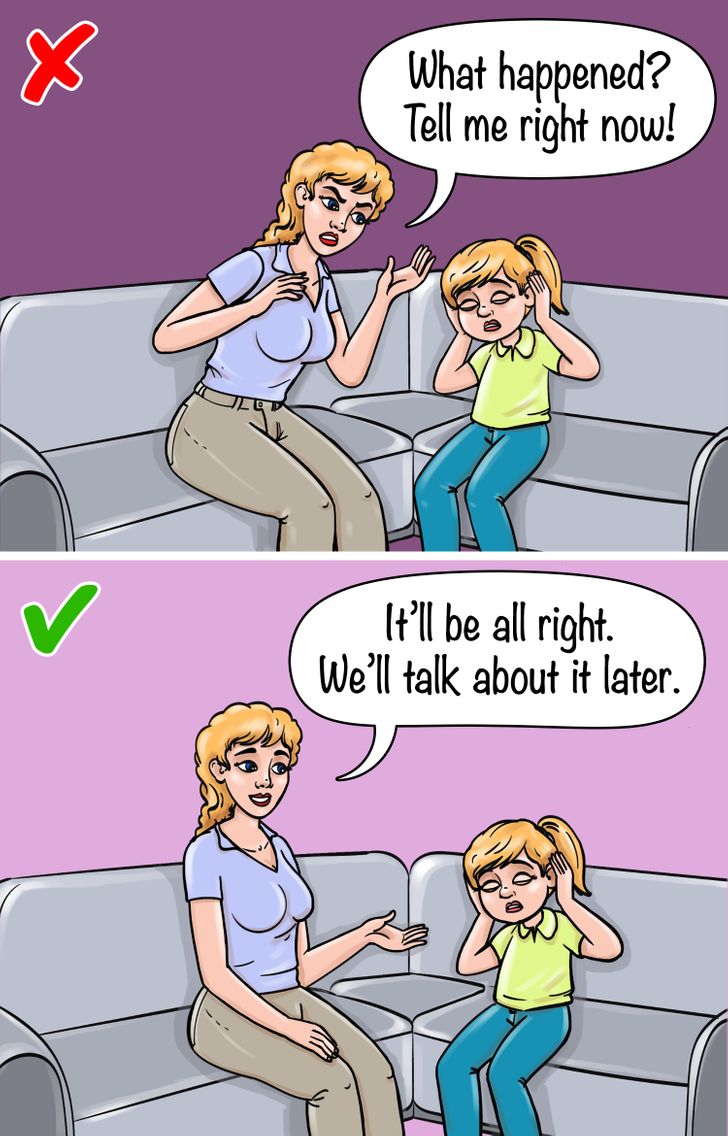
It’s inevitable: failure will come as it did for all of us. It’s a type of lesson that we get when we take risks, especially when we’re young. But what’s important for your kid is to learn how to move through it and learn that she needs to be ready for the next time.
- Right after a disaster occurs, change the topic. Don’t push her to analyze what went wrong and don’t assure her that you can fix it. Right now she needs a break because her fear center is on fire. Let her take a break for 30 minutes or 3 hours.
- Once she’s ready, tell her to fly up in her mind and see the house, school, or town from above. Talk about how she’s seeing the situation from that perspective. This will take the brain out of fear mode and allow her to see things more broadly.
- The goal is for her to see that failure is not a reason to back up, but rather, to move forward even stronger. Now, together, find a better solution for how to deal with her friends, exams, etc.
4. Tell her to add “maybe” to her stories.
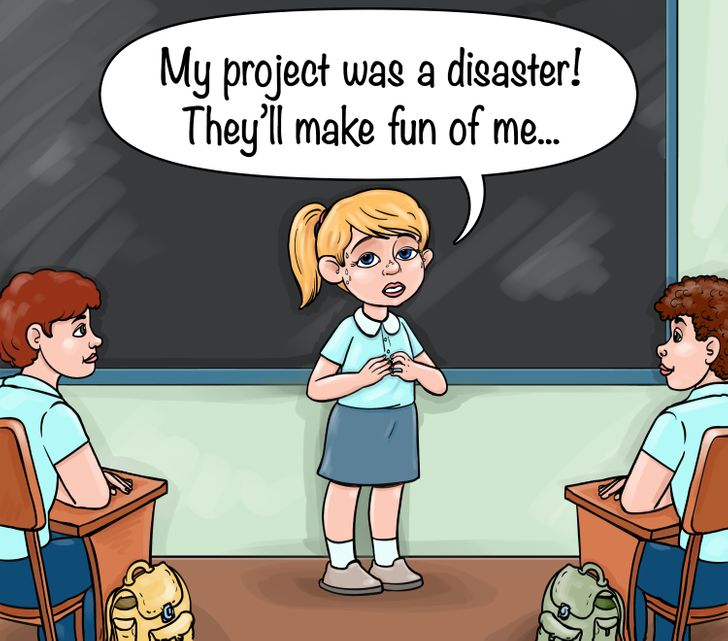
The goal here is to rewire how her brain works and one great way to do this is to teach her to add “maybe” when she explains and analyzes a situation. Here’s how to do it:
- This might even have the power to stop that wild cycle of rumination. This can be helpful if she can’t stop being obsessed about certain problems, like how she “failed” to present a project in front of her class, and now she assumes that everyone thinks the worst of her.
- Now it’s time to help her tell the story with “maybe.” This can result in phrases like: “Maybe the kids didn’t pay attention,” or “Maybe tomorrow someone else will make a mistake,” or “Maybe there was a dog outside and everyone was looking at it.”
- No matter how realistic these sentences are, they will help her stand still and stop spinning, which will give her a chance to look at things from a different perspective.
5. Let her make her own choices.
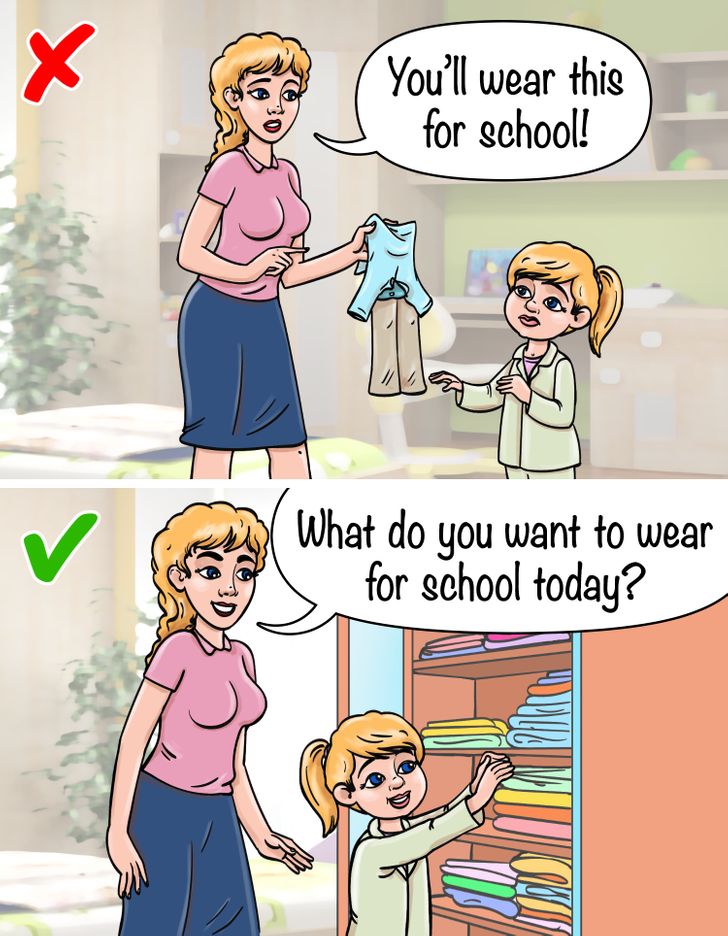
When you don’t let your kid make a decision, she most probably does this outside the home as well. This can lead to her making bad choices, which can lower her confidence even more.
- Give her the opportunity to practice making decisions. It can be as simple as involving her in everyday choices and chores.
- Let her choose what she wants to wear, what chores she wants to be responsible for this week, how she wants to wear her hair, etc.
- When your daughter senses that you trust her with the decisions, she will get the message that she is capable of doing things herself.
6. Praise her for her efforts and not for her performance.

If you praise your daughter and say she did a good job but it doesn’t work, take a different approach. Ask her what she achieved thanks to the effort she put forth. This way, she’ll be able to see the results herself and will learn what she needs to work on more.
7. Share your past failures.
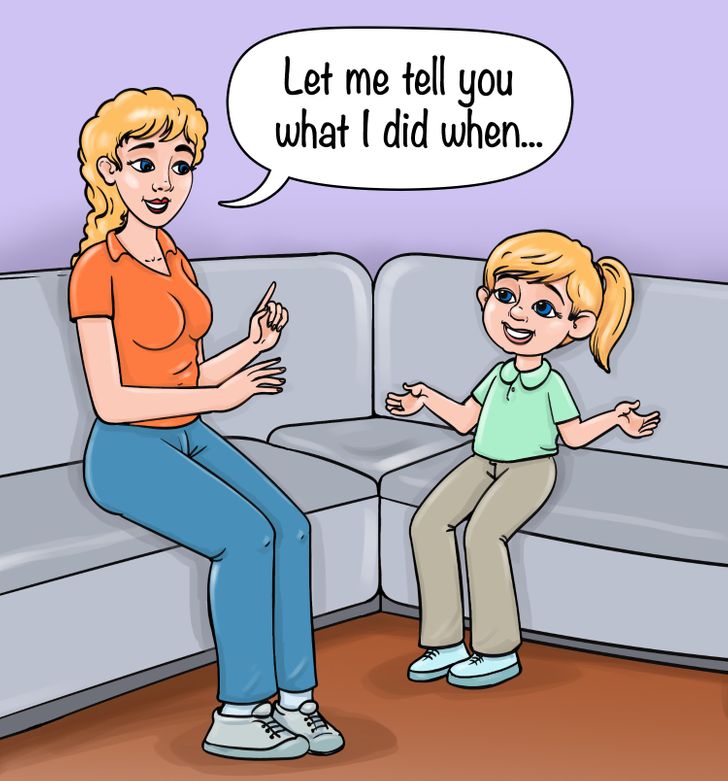
To ensure all of these tips are effective, you should open up in front of your daughter. Parents should be the ones who are role models, experiencing failures and risks along the way, so that she can build up her confidence. Here’s what you can do:
- Express your feelings and worries about a new challenge you can pass — one that scares you. Even better, ask her to be part of it by asking her for advice. Allow her to be the expert because she will be able to analyze the situation.
- Talk about failures you’ve had in the past and how scared you were at that time. Show her that no matter how messed up things were, you were able to recover and became a better person because of it.
- Admit that you were wrong or too obsessive over her. Imagining the worst and focusing on that is not healthy and it means you should call yourself out from that position. Tell your daughter: “Sorry that I let my obsessive overthinking get the best of me.” This will allow her to recognize when it happens to her.
Did you notice a difference in your daughter’s confidence once she turned 8? What steps did you take to help her?
Comments
when I went to school, my mom was just like this. She blamed me a lot for not getting good points (it didn't happen too often, but we all have those bad days). She thought that by getting angry she will get me "motivated" and I will study better..
Sorry to say that.. but I have never understood parents who tried to influence their kids through such tough ways :(
oh yeah. Going to school made me feel anxious when I was a kid ?
Have you talked to your mom about this though?
this problem got fixed itself somehow. When I got older my mom decided that I'm responsible enough and can manage my studies myself. She barely checked my results because she saw I was dedicated to study and was doing fine. Honestly it felt great
Related Reads
Why Most French Kids Don’t Throw Tantrums

12 Comics That Will Ring a Bell With Anyone Who’s Ever Fallen in Love

I Refuse to Babysit My Twin Sister's Baby After I Discovered a Life-Altering Secret

12 Entitled Client Moments That Made People Want to Quit

A Woman Tried to Steal My Seat on the Plane Using an Unsettling Tactic

20 Times Kids Were Too Smart for Their Age and Made Us Laugh Until We Cried

17 Warm Stories About Pets Who Come to Rescue Any Time

My Husband Made My Life Hell, So My MIL Taught Him a Lesson He’ll Always Remember

12 Revelations From Kids That Sent Shockwaves Through Their Families

My Mother-in-Law Devoured Our $2000 Wedding Cake, So I Iced Her With Sweet Revenge

15 People Who Can Participate in “Fear Factor” After Having Guests in Their House

I Gave My MIL a Fake House Key and Shamed Her in Front of the Whole Family
